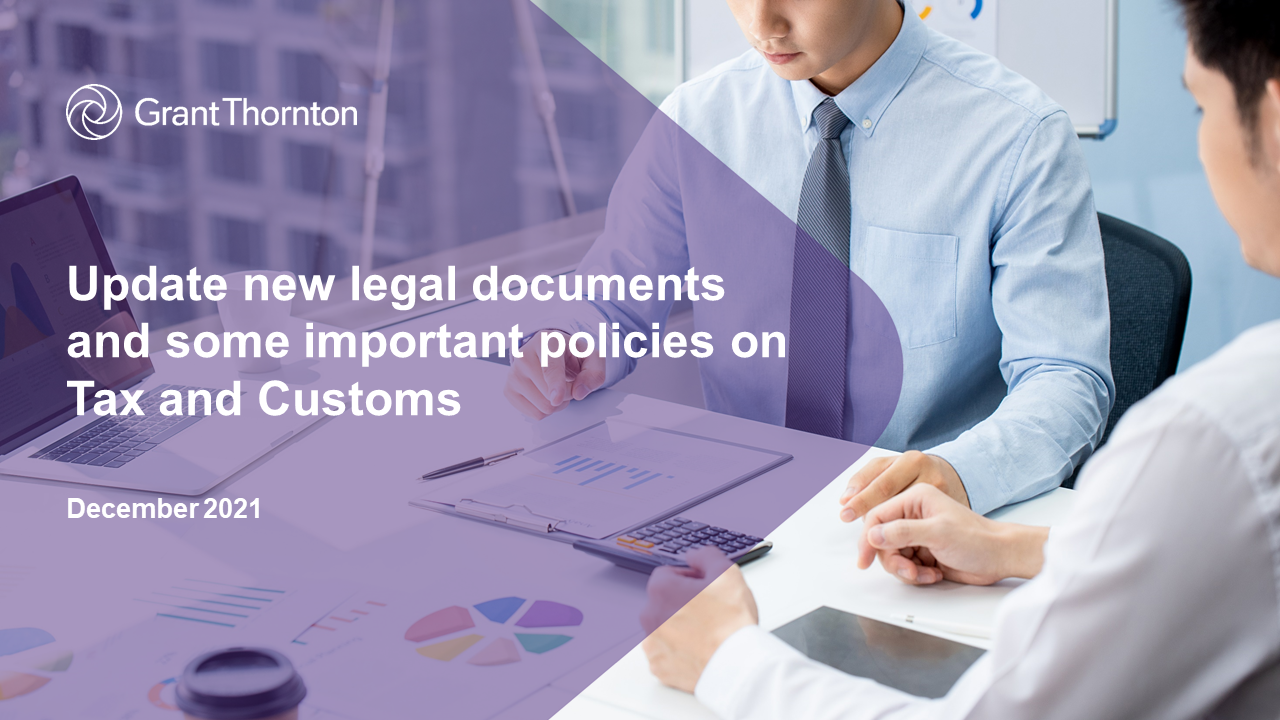-
International Financial Reporting Advisory Services
IFRS reporting advisory serivces of Grant Thornton are carried out by our dedicated team with expertise in IFRS implementation.
-
Audit Services
• Statutory audit • Review of financial statements and financial information • Agreed-upon procedures • FRAS services • Compilation of financial information • Reporting accountant • Cross-border audit • US GAAP audit
-
Audit Quality
We have various methods of monitoring our system of quality control and engagement quality, including real-time involvement of coaches and national office personnel on select audit engagements, reviews of issuer audit engagements prior to archiving by someone outside of the engagement team, and internal inspections of assurance engagements and the system of quality control.
-
Audit Approach
Audit Approach
-
Licensing services
Licensing services
-
International tax planning
Our extensive international network provides us with significant resources to meet all your expansion goals. We strive to develop commercially focused and tailored tax strategies to minimise tax exposures and maximise business efficiency.
-
Expatriate tax planning
We have a broad knowledge base and skills to assist you keep your personal income taxes to a legitimate and reasonable level, while remaining compliant with legislation. We can develop a personalised package for each key employee to take maximum advantage of the exemptions and incentives available.
-
Tax advisory
We will review the proposed business model and transactions and advise on tax implications and recommendations to optimize the tax opportunities under the local regulations and treaties which Vietnam entered into. Furthermore, we coordinate with our GT global tax team to provide a comprehensive tax advisory for the countries involved in the business model and transactions.
-
Tax compliance services
This service is designed to assist enterprises to cope with the statutory tax declaration requirements in line with the Vietnamese tax laws as well as the frequent changes and updates in tax laws.
-
Tax health check
Our Tax Health Check involves a high-level review of specific tax areas to highlight the key issues that need to be rectified in order to reduce tax risks. Through our extensive experience, we have identified key risk areas in which many enterprises are not fully compliant or often overlook potential tax planning opportunities. Our tax health check service represents a cost-effective method to proactively manage risks and reduce potential issues arising as a result of a tax inspection.
-
Transfer Pricing
Transfer pricing is a pervasive tax issue among multinational companies. In Vietnam, the tax authorities require special documentation to report related party transactions. Compliance with transfer pricing regulations is an important aspect of doing business effectively in Vietnam as failure to do so may result in significant penalties.
-
Tax due diligence
We conduct tax due diligence reviews of target companies to analyse their tax exposure and position in relation to acquisitions, mergers or consolidations. We are able to integrate this service with our Advisory Services department in order to offer a comprehensive, holistic due diligence review.
-
Customs and international trade
Our experienced professionals can help you manage customs issues more effectively through valuation planning and making use of available free trade agreements. We also assist Clients in optimising their customs procedures by making use of potential duty exemptions and efficient import-export structures. Risk mitigation activities include customs audit defense and compliance reviews.
-
M&A Transaction
We advise numerous foreign investors on efficient tax structures for their investments. Our experience allows you to consider all the options and set up a corporate structure that meets both operational and tax efficiency requirements. In short, the structure that is best for you.
-
Industrial Zones – Picking A Location For Your Business
Grant Thornton Vietnam’s one-stop services are designed to provide comprehensive support to both new and current investors who are planning to expand or restructure their business in Vietnam. Our professionals have established strong working relationships with landlords, property developers and authorities at various localities. With extensive experiences in liaison with the relevant agencies, we offer assistance including negotiation on land rental rates and efficient management of licensing process. Our customized and flexible solutions can bring benefits of cost efficient location, accelerate licensing process, and optimize tax opportunities while remaining in compliance with legislation.
-
Tax Audit Support
Tax audit support services provide comprehensive assistance to your business in Vietnam. Recent tax practices have shown the general tendency of launching routine tax audit on yearly basis. Tax authorities have been effectively using more sophisticated methods to identify target entities from across different industry sectors.
-
Business Risk Services
Business Risk Services
-
Transaction Advisory Services
Transaction Advisory Services
-
Valuation
Valuation
-
Business consulting services
Finance Management Advisory
-
Accounting services
Accounting services
-
Taxes compliance within outsourcing
Taxes compliance within outsourcing
-
Payroll, personal income tax and labor compliance
Payroll, personal income tax and labor compliance
-
Secondments/Loan staff services
Secondments/Loan staff services
-
Compilation of the financial and non-financial information
Compilation of the financial and non-financial information
-
Accounting systems review and improvement
Accounting systems review and improvement
-
Initial setting-up for accounting and taxes systems
Initial setting-up for accounting and taxes systems
-
Management accounting and analysis
Management accounting and analysis
-
Comprehensive ERP system solution
ERP software is a tool for business operations, production management, order processing and inventory in the business process. Today, ERP software for small and medium businesses has been greatly improved to help businesses manage their business better. The article below will answer all relevant information about what ERP software is and offer the most suitable ERP solution for businesses. Let's follow along!
-
Analyze Business Administration data
We believe in the value that data can bring to the success and development of every business. Our team helps design data architecture supported by tools, to support business governance and provide useful information to management.
-
Financial reporting compliance solution package
Putting financial issues at the heart, this service helps ensure that financial reports for customers comply with both the requirements of Vietnamese accounting regulations and standards (VAS) as well as reporting standards. international finance (IFRS).
-
Third-party ERP extensions
ERP is a long-term solution that requires long-term travel, not short-term. We understand that many businesses cannot deploy the entire ERP system at once due to many different reasons, instead businesses can deploy each part. Over time, these solutions can be expanded to accommodate improved business processes or can even link completely new processes across different departments.
-
Localize, deploy and rebuild the project
Quite a few ERP projects need to be implemented according to current Vietnamese requirements and regulations, but still comply with common international business requirements. These projects need some improvements and adjustments in the right direction.
-
Consulting on technology solutions
We support the selection and implementation of the most suitable solutions, ensuring business efficiency and performance. We will work closely with customers to plan, evaluate and implement the right technology investment strategies and solutions to meet the development needs of businesses.

-
Offshore company establishment service
Using the offshore company model will facilitate the owner in the process of transaction and expand overseas markets, take advantage of the tax policy with many incentives and protect the value of the family enterprise's assets.
-
Private Trust Advisory
The development of the economy with many modern financial instruments has brought many advantages and opportunities for the enterprises, but there are still certain potential risks in any type of business. So how to protect your asset value with an appropriate company structure while stay compliance with relevant regulations?
-
Our values
We have six CLEARR values that underpin our culture and are embedded in everything we do.
-
Learning & development
At Grant Thornton we believe learning and development opportunities help to unlock your potential for growth, allowing you to be at your best every day. And when you are at your best, we are the best at serving our clients
-
Global talent mobility
One of the biggest attractions of a career with Grant Thornton is the opportunity to work on cross-border projects all over the world.
-
Diversity
Diversity helps us meet the demands of a changing world. We value the fact that our people come from all walks of life and that this diversity of experience and perspective makes our organisation stronger as a result.
-
Contact us
Contact us
-
Available positions
Experienced hires
-
Available positions
Available positions
1. Circular 80/2021/TT-BTC guiding the implementation of a number of articles of the Tax Administration Law and Decree 126/2020/ND-CP
On 29 September 2021, the Ministry of Finance issued Circular 80/2021/TT-BTC guiding the implementation of a number of articles of the Tax Administration Law and Decree 126/2020/ND-CP dated 19 October 2020 by the Government. The Circular takes effect from 1 January 2022. The following circulars will be superseded from the effective date of Circular 81:
- Circular 156/2013/TT-BTC guiding on some articles of the Law on Tax Administration, the Law on the Amendments to the Law on Tax Administration and Decree 83/2013/ND-CP;
- Circular 99/2016/TT-BTC guiding on management of Value Added Tax refund;
- Circular 31/2017/TT-BTC amending and supplementing a number of articles of Circular 99/2016/TT-BTC guiding the management of value-added tax refund;
- Circular 208/2015/TT-BTC on activities of tax advisory councils of communes, wards and townships;
- Circular 71/2010/TT-BTC ontax assessment for automobile and motorbike traders that write the prices of automobiles and motorbikes on invoices issued to consumers lower than normal market prices;
- Circular 06/2017/TT-BTC amending and supplementing Clause 1 Article 34a Circular 156/2013/TT-BTC;
- Circular 79/2017/TT-BTC amending and supplementing Item b1 Point b Clause 4 Article 48 Circular 156/2013/TT-BTC.
Circular 80/2021/TT-BTC was issued to replace all current tax declaration forms applied from the tax period starting from 1 January 2022 onward. Tax finalization dossiers for tax period of 2021 can also use the new form according to this circular. Circular 80/2021/TT-BTC has numerous changes compared to the current tax administration regulations with the aim of providing more detailed guidance and clarification of Decree 126/2020/ND-CP and change the tax administration system with spirit of streamlining the process and supporting taxpayers.
2. Circular 100/2021/TT-BTC amending and supplementing a number of articles of Circular 40/2021/TT-BTC providing guidance on VAT, PIT and tax management of business households
On 15 November 2021, the Ministry of Finance issued Circular 100/2021/TT-BTC amending and supplementing a number of articles of Circular 40/2021/TT-BTC has some notable points as follows:
- The organization which is the owner of an e-commerce platform, has responsibility to declare and pay tax on behalf of the individual according to his or her authorization. Circular 40/2021/TT-BTC requested that owners of e-commerce platforms shall provide information about the individuals’ business operation on their platforms.
- The lessor who earns revenue in fewer than 12 months in the calendar year with amount of not exceeding 100 million VND per year shall be exempted from VAT and PIT. The Circular 40/2021/TT-BTC gave an example whereby applying 12 consecutive months to determine if the revenue is exceed 100 million VND per year as the basis for exemption from VAT and PIT, which leads to the case that an individual with an income of less than VND 100 million in the year might still subject to VAT and PIT (because the income for 12 consecutive months exceeds the taxable level).
Circular 100/2021/TT-BTC takes effect from 1 January 2022.
3. Decree 102/2021/ND-CP amending and supplementing some articles of the Decrees regulating administrative penalties
On 16 November 2021, the Government issued Decree 102/2021/ND-CP amending and supplementing some articles of Decree regulating administrative penalties for tax or invoices related violations; customs offences; insurance business; lottery business; management and use of public property; saving; prevent waste fund; national reserve; state treasury; the fields of accounting and independent audit. The Decree has some notable points as follows:
- Penalty ranging from 20-50 million VND shall be imposed for one of the following violations: Giving or selling ordered invoices which have not yet been issued; Giving or selling invoices ordered by customers to other entities or persons.
- Time limit for imposition of an invoice-related administrative penalty shall be 02 year (instead of 01 year as current regulations) from 1 January 2022
- Amending, supplementing Point 3 Clause 4 Article 26 detailing on penalty for the act of causing the loss, burning or damage of invoices. Specifically, fines ranging from 4-8 mil VND shall be imposed for one of the following violations: Causing the loss, burning or damage of invoices already released or purchased from tax authorities even though they have not been issued yet; Causing the loss, burning or damage of issued invoices (the replicas intended for clients) during use although sellers have already declared or paid taxes, or have had documents or records evidencing the sale of goods or the provision of services.
- Penalty ranging from 5-10 million VND shall be imposed for the act of causing the loss, burning and damage of issued invoices, or invoices already submitted for completion of tax declaration or payment procedures, or those are in use or storage, except the cases specified in clause 1, 2 and 3 of Article 26.
Decree 102/2021/NĐ-CP takes effect from 1 January 2022.
4. Decision 33/2021/QD-TTg amending and supplementing some articles of Decision 23/2021/QD-TTg on implementation of certain policies to support employees and employers in difficulty due to the Covid-19 Pandemic
On 6 November 2021, the Government issued Decision 33/2021/QD-TTg amending and supplementing some articles of Decision 23/2021/QD-TTg on implementation of certain policies to support employees employers in difficulty due to the Covid-19 Pandemic, with specific guidance as follows:
- Expanding eligibility for support under Decision No. 23/2021/QD-TTg for employers who have fully paid social insurance premiums or are temporarily suspending payment to the retirement and survivorship fund until the end of January 2021 affected by the Covid-19 epidemic, which leads to a reduction of 10% or more in the number of employees participating in social insurance at the time of application submission compared to January 2021.
- Issue a document by the social security agency confirming that the employer has fully paid unemployment insurance premiums for employees for full 12 months or more until the time of requesting support and has fully paid unemployment insurance premiums for employees who are going to attend the training.
- Amending and supplementing regulations on employees on suspension of employment contracts, under unpaid leave to receive support. Specifically, their period of suspension of employment contracts or unpaid leave within the term of the employment contracts is from 15 consecutive days or more from 1 May 2021 to the end of 31 December 2021, with a start date of suspension of employment contracts or unpaid leave between 1 May 2021 and 31 December 2021, and They have contributed to compulsory social insurance up to the month preceding the time of suspension of employment contracts or unpaid leave.
5. Decision 1490/QD-TCT promulgating the Regulation on direct consultation in the settlement of complaints at tax authorities
Decision No. 1490/QD-TCT dated 22 October 2021 of the General Department of Taxation on promulgating the Regulation on direct consultation in the settlement of complaints at tax authorities. In this regard, the decision has a number of notable points as follows:
- The organization of direct consultation is considered on the basis of one or more factors such as: the complaint content is complicated; large amounts of taxes, fines, and late payment interest; there are many different views when applying regulations of legal documents; related to legal policies other than tax legislation…
- The consultation results are the basis for reporting to the heads of tax authorities for consideration and reference before deciding on the complaint settlement plan.
- In case the complaint settlement plan has more than 50-70% of the total members voting unanimously, the unit in charge of consultation shall report to the Head of the tax authority for consideration and settlement of the complaint according to this method or continue to organize the next consultation.
- Outlining the rights and responsibilities of stakeholders in the consultation process
6. Official Letter 4144/TCT-CS of the General Department of Taxation on introduction of new regulations of the Circular 78/2021/TT-BTC dated 17 September 2021 providing guidelines on invoices and records
On 28 October 2021, the General Department of Taxation on introduction of new regulations of the Circular 78/2021/TT-BTC dated 17 September 2021 providing guidelines on invoices and records as we have mentioned in the last newsletter. This Official Letter has some notable points as follows:
- Good sellers or service providers that are enterprises, business entities or other organizations are allowed to authorize third parties that is a related party of the seller according to Clause 2 Article 5 Decree 132/2020/ND-CP, eligible to use e-invoices and is not suspended from use of e-invoices to issue e-invoices. The authorization must be made in writing (authorization contract or authorization agreement) between two parties. In addition, the authorizing party and the authorized party must register the authorization with the tax authorities.
- If the e-invoice having errors and has been corrected first time (adjustment or replacement) but then is found to have other errors, these errors shall be handled using the same method as the first error. The seller may choose to notify the adjustment of each or multiple error e-invoices to the tax authority by the last day of the VAT declaration period in which e-invoices with error are adjusted.
- Enterprises and business entities that have informed the issuance of externally-printed invoices or internally-printed invoices, unauthenticated e-invoices or have applied for use of authenticated e-invoices, or have purchased invoices from tax authorities before the date of promulgation of the Circular 78/2021/TT-BTC are allowed to continue using these invoices until 30 June 2022.
- If enterprises and business established within the period from the date of issuance of the Circular No. 78/2021/TT-BTC to 30 June 2022 inclusively meet IT infrastructure requirements, they shall follow guidelines given by the tax authorities.
7. PIT exemption with some costs and benefits related to the Covid-19 epidemic
- Official Letter 4110/TCT-DNNCN of the General Department of Taxation
On 17 October 2021, the General Department of Taxation issued Official Letter No. 4110/TCT-DNNCN on tax policies for expenses related to the Covid-19 epidemic. Specifically, the actual costs of epidemic prevention and control that are incurred and have sufficient supporting documents shall be exempted from PIT including:
-
- Expenses for quarantine including meals, accommodation, Covid-19 testing in Vietnam and abroad for business trips abroad;
- Transportation costs from the place of entry to Vietnam or from the place of detection to the quarantine facility;
- Expenses for living during the quarantine period;
- Cost of testing for Covid-19 or buying test kits for employees, buying equipment to protect employees from the risk of infection during work;
- Accommodation expenses when employees work "3-on-the-spot".
- Official Letter 4102/TCT-DNNCN of the General Department of Taxation
On 25 October 2021, the General Department of Taxation issued Official Letter 4102/TCT-DNNCN guiding in determining taxable income of employees. Specifically, in case the employers use the entire amount obtained from the reduction of contributions to the Insurance Fund for occupational accidents and diseases for employees to prevent and control Covid-19 according to the provisions of Decision No. 23/2021/QD-TTg dated 07 July 2021 of the Prime Minister providing for the implementation of a number of policies to support employees and employers facing difficulties due to the Covid-19 pandemic, this amount shall not be subject to PIT.
8. Official Letter 4125/TCHQ-TXNK on destruction of imported goods
On 20 August 2021, the General Department of Customs issued Official Letter No. 4125/TCHQ-TXNK on customs procedures when destroying raw materials, exported products, scrap products, machinery and equipment to create fixed assets, specifically:
- About sending a notice to the customs authority before destroying imported, manufactured and exported goods with type code E31:
Goods imported for export production that must be destroyed include: Excess raw materials and supplies, scrap, discarded products and damaged finished products that must be destroyed from 25 April 2021 (effective date of Decree No. 18/2021/ND-CP) is exempt from import tax. Enterprises must send a written notice to the customs authority before destruction, clearly stating the destruction method and location. The destruction must comply with the provisions of the law on environment.
- Regarding the destruction of imported goods to create fixed assets:
The destruction of imported goods to create tax-exempt fixed assets according to the provisions of the Law on Import Tax and Export Tax must comply with regulations and under the direct supervision of customs officers. Before destroying, the taxpayer must notify the customs office of the destroyed goods, the reason for the destruction, the time and place of destruction, the written permission of the competent authority for destruction as prescribed. In case goods are allowed to be destroyed and complete all procedures as prescribed by law, they will be exempt from import tax.
9. Official Letter No.4783/TCHQ-TXNK on handling of export production goods allowed to be destroyed
On 8 October 2021, the General Department of Customs issued an Official Letter guiding the handling of taxes on raw materials and supplies imported for export production, manufactured products for export, scrap and discarded products forming in the production process, there is a need to destroy as follows:
- For imported raw materials and supplies that have not yet been put into production; scraps and waste products to be destroyed:
- In case raw materials and supplies imported in the form of export production, scrap and discarded products created in the production process are allowed to be destroyed and actually destroyed in accordance with the customs law, they are exempted from import tax.
- In case, after destruction, other products are obtained that the company uses to sell inland, they must declare and pay special consumption tax (if any), environmental protection tax (if any), value tax increase for tax authorities.
- For finished products of sufficient quality before being released from the factory but then sent for testing and then destroyed or cannot be found for export markets, they must be destroyed:
- In case the manufactured product is allowed to be destroyed and has actually been destroyed in accordance with the customs law, it will be exempted from import tax.
- In case after destruction, the company can use other products to sell inland, they must declare and pay Special Consumption Tax (if any), Environmental protection tax (if any), and VAT to the tax office.
- In case of preliminary destruction of imported materials, supplies and finished products:
In case of preliminary destruction of raw materials, supplies, finished products and semi-finished products for export to the domestic market which are not considered scrap shall not be eligible for import tax exemption. In this case, the enterprise will have to declare a new customs declaration and pay tax on raw materials and supplies used to produce finished and semi-finished products that must be destroyed.
10. Official Letter No. 7074/TXNK-CST on goods imported on the spot for export production
On 15 September 2021, the General Department of Customs issued an Official Letter guiding the tax policy in case domestic enterprises import raw materials for the production of goods for export on the spot from export processing enterprises, industrial zones. non-tariff tax and from other domestic enterprises in Vietnam as designated by foreign traders according to the type of export production, specifically:
- In case a domestic enterprise imports goods directly from an export processing enterprise to produce goods for export through a sales contract, it shall be exempt from import tax if it meets the provisions of Clause 2, Article 12 of Decree 134. 2016/ND-CP. The declaration uses the type code E31 - import of production materials for export, which is exempt from import tax and not subject to VAT.
- In case that an export processing enterprise selling goods to a foreign organization or individual is appointed by a foreign organization or individual to deliver goods to a domestic enterprise through a purchase and sale contract between a domestic enterprise and a foreign enterprise, goods imported by domestic enterprises on the spot from export processing enterprises are exempt from import tax if they meet the provisions of Clause 2, Article 12 of Decree 134/2016/ND-CP. The declaration uses the type code E31 - import of production materials for export, which is exempt from import tax, not subject to VAT.
- In case that domestic enterprise signs to purchase goods with a foreign trader not present in Vietnam, and is designated by the foreign trader to receive goods from another enterprise in Vietnam, the on-spot imported products shall be registered with the registration form. declaration according to the type of business import (A11) or import business and production (A12), must declare and pay import tax.
For other taxes, enterprises must declare and pay taxes corresponding to declaration codes A11 and A12.
When in-country imported products are put into production and exports to a foreign country or a non-tariff zone, the enterprise is entitled to a refund of import tax corresponding to the amount of in-country imported raw materials and supplies constituting the product exported.













